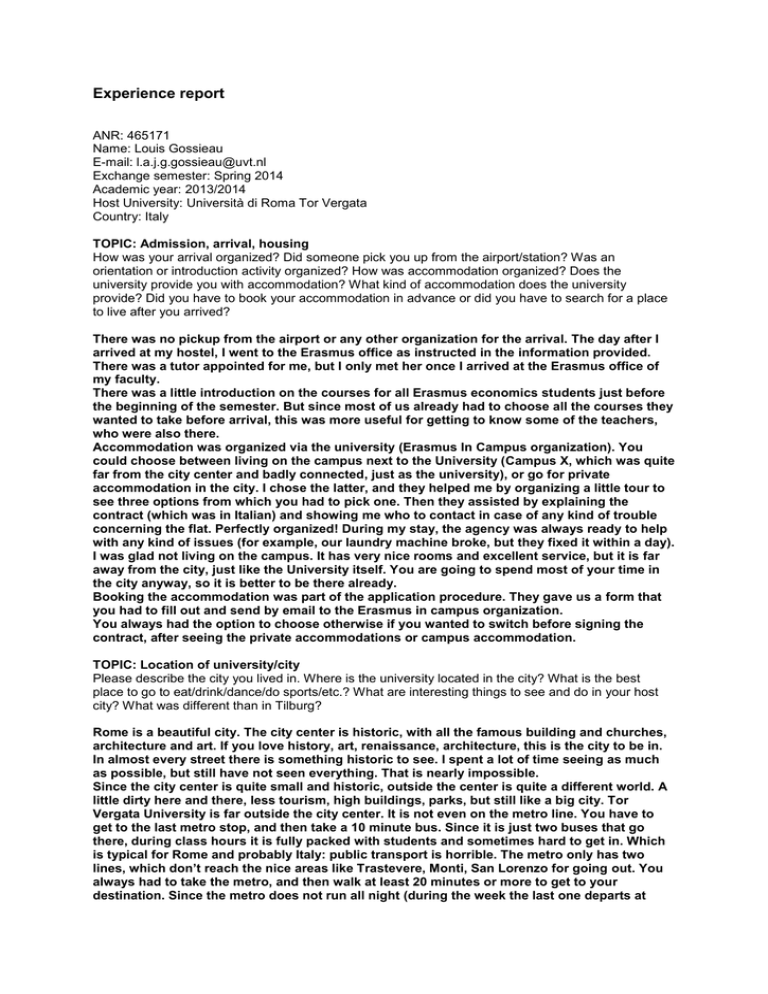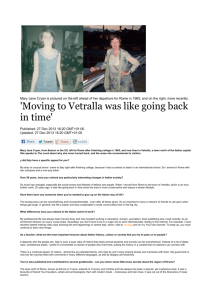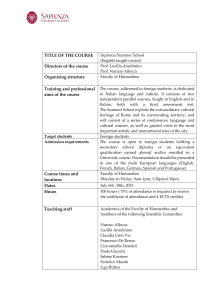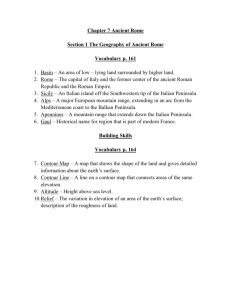Experience report
advertisement

Experience report ANR: 465171 Name: Louis Gossieau E-mail: l.a.j.g.gossieau@uvt.nl Exchange semester: Spring 2014 Academic year: 2013/2014 Host University: Università di Roma Tor Vergata Country: Italy TOPIC: Admission, arrival, housing How was your arrival organized? Did someone pick you up from the airport/station? Was an orientation or introduction activity organized? How was accommodation organized? Does the university provide you with accommodation? What kind of accommodation does the university provide? Did you have to book your accommodation in advance or did you have to search for a place to live after you arrived? There was no pickup from the airport or any other organization for the arrival. The day after I arrived at my hostel, I went to the Erasmus office as instructed in the information provided. There was a tutor appointed for me, but I only met her once I arrived at the Erasmus office of my faculty. There was a little introduction on the courses for all Erasmus economics students just before the beginning of the semester. But since most of us already had to choose all the courses they wanted to take before arrival, this was more useful for getting to know some of the teachers, who were also there. Accommodation was organized via the university (Erasmus In Campus organization). You could choose between living on the campus next to the University (Campus X, which was quite far from the city center and badly connected, just as the university), or go for private accommodation in the city. I chose the latter, and they helped me by organizing a little tour to see three options from which you had to pick one. Then they assisted by explaining the contract (which was in Italian) and showing me who to contact in case of any kind of trouble concerning the flat. Perfectly organized! During my stay, the agency was always ready to help with any kind of issues (for example, our laundry machine broke, but they fixed it within a day). I was glad not living on the campus. It has very nice rooms and excellent service, but it is far away from the city, just like the University itself. You are going to spend most of your time in the city anyway, so it is better to be there already. Booking the accommodation was part of the application procedure. They gave us a form that you had to fill out and send by email to the Erasmus in campus organization. You always had the option to choose otherwise if you wanted to switch before signing the contract, after seeing the private accommodations or campus accommodation. TOPIC: Location of university/city Please describe the city you lived in. Where is the university located in the city? What is the best place to go to eat/drink/dance/do sports/etc.? What are interesting things to see and do in your host city? What was different than in Tilburg? Rome is a beautiful city. The city center is historic, with all the famous building and churches, architecture and art. If you love history, art, renaissance, architecture, this is the city to be in. In almost every street there is something historic to see. I spent a lot of time seeing as much as possible, but still have not seen everything. That is nearly impossible. Since the city center is quite small and historic, outside the center is quite a different world. A little dirty here and there, less tourism, high buildings, parks, but still like a big city. Tor Vergata University is far outside the city center. It is not even on the metro line. You have to get to the last metro stop, and then take a 10 minute bus. Since it is just two buses that go there, during class hours it is fully packed with students and sometimes hard to get in. Which is typical for Rome and probably Italy: public transport is horrible. The metro only has two lines, which don’t reach the nice areas like Trastevere, Monti, San Lorenzo for going out. You always had to take the metro, and then walk at least 20 minutes or more to get to your destination. Since the metro does not run all night (during the week the last one departs at 11.30pm, on Friday and Saturday at 1.30am), you had to take a night bus back home. I lived along the Metro A line, so the night bus 1 was the one to get. However, since this bus is the only bus that follows the same route as Metro A, it was a lot of the times completely packed with people. Italians don’t want to wait for the next one, so they keep on pushing themselves in the bus. Unsafe, uncomfortable and most of the times just disgusting. Taxis are expensive, even more expensive than in the Netherlands, so those are not an option as well. As a Dutch being used to take the bicycle back home, this was maybe the biggest frustration of living in Rome. Those areas I mentioned were the best ones to go to for drinks and nights out, even if you had to take the night bus for it afterwards. We always bought some beer and drank it outside near a fountain or on a square full of people. It was the cheapest and the most fun way to go out. Going out in clubs was okay in the beginning, to get to know some people, but was extremely expensive (entrance around 10 euros, beers and other drinks at least 5 euro, even student parties). Especially when you don’t like clubs anyway, like me. TOPIC: Academics Which courses did you take and why? Which courses would you recommend? What did the courses add to your program at Tilburg University? How does the university compare to Tilburg University concerning the level of the courses, use of extra material, level of English, workload, etc.? Overall, were you happy with your academic achievements during your exchange? Please describe the campus of your host university. I took Macro & Microeconomics for Business (12 ECTS), Global Anthropology in Urban Settings (6), Environmental Economics (6) and Management Consulting (6). All four courses I would recommend. Global Anthropology was fun since each week we had 1 class in the university and 1 class set up as a field trip to places in Rome linked to the topic of that week. We saw places you would never consider going to: a squatting place, the Great Mosque of Rome (the biggest one on Western Europe), a borghata area (project houses built by Mussolini), and a refugee meeting underneath a church. We learnt about the way Romans lived and how the city changed over the last 150 years. It really gave us a different view on city you would never had otherwise. Macro & Micro were particularly useful since I am former HBO student, I did not have these kind of courses as an economics student before. If you have similar courses during you bachelor, then this is probably more or less the same. The teachers (one for Micro, one for Macro) were of extremely high level, especially Paolo Paesani for Macro. Management Consulting was, theory wise, fairly easy and straightforward. The interesting part though, were the seminars. Each week there were 2 or 3 companies visiting to present a case or explain their activities. Companies like KPMG, Deloitte, Boston Consulting Group, etc. High level and very informative. Environmental Economics was interesting since it was on a completely different topic than any other economics course I had before. The difficulty of the course was quite high, so it was hard to keep up with it. Topics like pollution, taxes, welfare and ethics are discussed combined with economics. Interesting, but certainly not easy. Compared to Tilburg University the level was on par or close to the courses here, especially Macro and Microeconomics, and Environmental Economics. Global was quite easy and basic, just like Management Consulting, but the extra activities made it definitely worth it. You did not need to buy any books, although you could buy copies of those books at the copy shop (yes, complete copies of expensive text books). Teachers spoke English pretty well and the workload was similar to what I was used to. Since they are all master courses (I had to take master courses since I was in my Master at UvT), the level is quite high. I always heard from other Erasmus students that foreign universities have lower level education and everything is all very easy, but that was not the case here. I had to work hard for my credits, attend classes (Micro economics did not have any slides available for example) and study for my exams. Luckily they had so-called pre-exams (unofficial exams organized by the teacher), by which you were able to finish you exams before June if you passed them all. Actual exams were in June and July, when temperatures are high and you don’t want to study at home all day. TOPIC: Social life Which social activities organized by the university or students? Did you have contact with local students? Did you have contact with other exchange students? How did you get along with the local students and other exchange students? Did you travel to other places/countries during your exchange? The university did not organize a lot of activities. I remember going to two Erasmus meetings, which were both an aperitivo (Italian buffet) and then some music and drinks, they started at 6 and lasted until 9 or 10 something. Local students where open to communicate and spoke English pretty well (the master courses were all in English so they had to), but a lot of them still lived with their parents outside of Rome and traveled by car (on average, kids leave the house when they are 30 years old). Hence, most of my social activities and friendships were with other Erasmus people and in the city center, and not with local students at the university. I just went to classes, but did not study for exams at the university or had to do projects with groups at the university like at UvT. In the beginning I got to know some Germans, Portuguese, Belgium, Spanish and American people and they remained my best friends for the rest of the semester. We had dinners together, went out, explored the city and some of them joined me on trips to Cinque Terre, Sardinia, Venice and Verona. I also traveled to Sicily and did a city trip including Florence, Siena, Bologna, and San Marino. Regional trains are fairly cheap, and flights to Sicily were among the cheapest I ever booked (35 euro return). And like I said, if you finish most of your exams early enough, you have plenty of time to do some travels. TOPIC: Living costs How did you finance your exchange period, apart from the grant you received from Tilburg University? What were your living expenses abroad like compared to Tilburg? What did you spend most of your money on? What would you advice future students to spend their money on? Please outline your approximate monthly budget whilst on exchange: housing, food, textbooks, etc. I got a Erasmus grant and had a state loan (via DUO studiefinanciering). Excluding travels I spent around 1000 euros a month on rent (460 all inclusive), groceries, social activities, phone (12 euro) and public transport (35 euro monthly ticket for bus and metro). No money was spend on text books or any school material except pen and paper. Groceries were almost as expensive as in the Netherlands, restaurants cheaper, but bars and clubs are more expensive. So going out with friends could become very expensive if you go to clubs or bars (even if organized by ESN or other student organizations!), but if you stay in areas like San Lorenzo, Trastevere or Monti you can save a lot of money on drinks if you buy them in little pizzerias or cheap looking bars and drink outside on the piazza’s (squares). A beer (66cl) is then around 2 euro or cheaper, cocktails around 3 euros. Rome is such a beautiful city, you should not waste your time inside bars but stay outside on the streets! TOPIC: Culture Did you experience culture shock while on exchange? How would you compare your host culture to your own culture? What did you learn about your own culture while on exchange? What was different about your host culture than you expected? What did you like and not like about your host culture? Do you feel you learned a lot about your host culture, and if not, what would you like to learn more? How would you describe your host countries culture? If you travelled to other cities/countries during your exchange, were they different than your host city/country, and how? I did not experience any culture shock. I got used to the Italian culture fairly quickly: no one is on time, bureaucracy is insane (several offices on different locations to get things done), public transport is horrendous. ‘Italians just don’t care’, is what we said to each other a lot if we were complaining about something once more. Other than that, Italians are incredibly kind and always able to help you. They are just not as organized as we northern cultures. If you try to speak Italian, they love it. If you ask them about food, way of living, drinks, they love to talk to you about it. So in a nutshell, it is a culture of extremes. There is a big difference between the northern (business attitude) and the southern Italians (more relax attitude), and Rome is considered to be exactly in the middle. I went to Sicily where the more southern culture is at its peak, very relax, kind and calm people. I also learned a lot about other cultures (Portuguese, German, American, Spanish) since you will hang out with a lot more Erasmus students. Especially living together with four different cultures can be confusing sometimes, but it is something that you have to get used to. I regret not learning the Italian language that well. I can understand the basics, and get the grip of a conversation, but I cannot produce any fluent sentences or make conversation. The language course provided was not good at all if you did not knew any basic Italian before you arrived. So if I was able to do it again, I would learn some Italian before arriving in Rome. You can get around with English and some Italian words, but it makes things so much easier. Sometimes I felt being rude not able to respond in Italian. TOPIC: Personal development What did you learn from the people you met during your exchange? Would you do things differently if you had the chance, and what would you do differently? What was your best experience, and what was your worst experience? What will you remember forever about your exchange period? What was the most important lesson you learned about yourself during your exchange period? Like I said, I would learn the Italian language in advance. Other than that, I don’t regret anything. I learnt to deal with other cultures, being more patient in my judgments and just trying to live alongside of a lot of different people without being able to do it exactly as I would like to do it. My best experience was definitely the many trips I made across Italy with or without friends. I actually don’t have a worst experience. Everything went perfect, no real trouble, passed all the exams, nothing was lost, stolen or robbed, no injuries or any other difficulties. I learnt a lot about different cultures, about art and architecture, history. I learnt how to get things done without knowing where to go or who to ask. I did not expect to get to know so many new people so easy without knowing anyone by the time I arrived. It is crazy to think about the little things you decided in the beginning that in the end determined who you got to know and how your semester would become. Being back for a couple of days now, I miss the luxury of being able to do something every single day. You could always text someone to hang out or explore the city. TOPIC: Tips for future students Would you recommend an exchange period? Would you recommend your host university? What should prospective students bring with them/leave behind? What preparation is required for going on exchange to this destination? Was there anything you should have done in preparation that you didn’t do? I would definitely recommend going on exchange and also going to Rome and Tor Vergata University. If you have the opportunity, choose a university in the city of Rome or at least one that is closer to the city center than Tor Vergata. But besides that, I would chose Rome again without any hesitation. It is amazing to start fresh once more, without knowing anyone, in a new country, city, and different culture among other cultures. Italy is an amazing country, with great local habits and many places to go. Traveling is easy and different cities are nearby or easily reached, so your time will be diverse and energetic if you keep your eyes open and are willing to learn. It felt like one big holiday. The only preparation I would advise is again the language. Learn at least some Italian, it will help you big time. I knew some French which was helpful already, but just not enough to feel comfortable.




